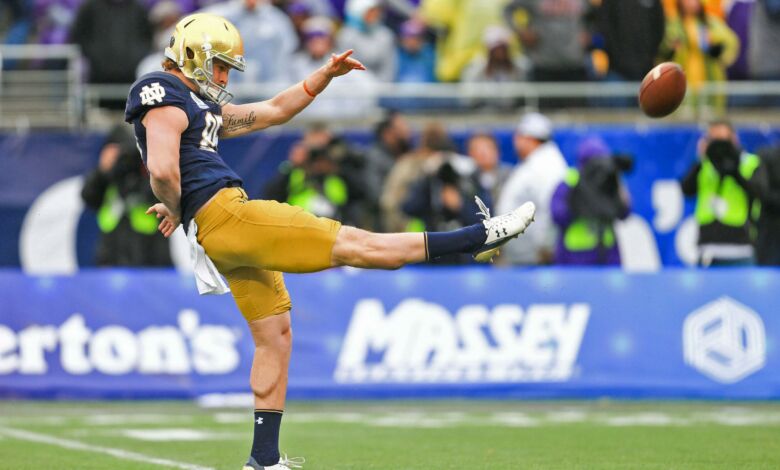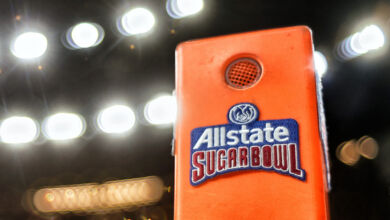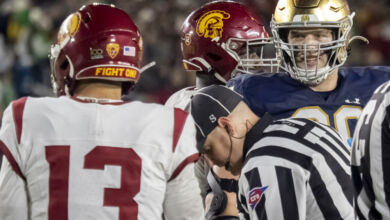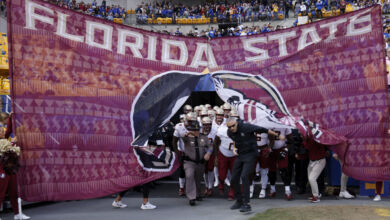
There are lots of ways to win a football game. There are also lots of ways to lose them. Some of those ways are obvious; your team can’t stop the run, you dominate your opponents line of scrimmage, you turn the ball over too much. What often happens when two evenly matched teams, who are rivals nevertheless, get together to play a football game, what decides the outcome is anything, but obvious. The difference is in the margins.
A missed tackle here. A fingertip catch there. A dubious penalty at the wrong time. All those little things contributed to Notre Dame losing at home to eventual national runner-up Georgia by a single point last season. When thinking about how the game could swing one way or the other, it’s important to think about the less obvious aspects of the contest, which I will attempt to do here.
Winning the Punting/Field Position Battle
The strength of both teams are their defenses, which means there is a high likelihood of a low scoring affair (the over/under is 47), which means lot of punts. Where each team sets up to play offense is important. Neither offensive coordinator figures to be very aggressive with their play calls until they reach their own 40, and first downs will be at a premium. If either punter is able to pin the offense back inside their own 20 consistently, it makes it that much more difficult for the opponent to reach a scoring position. You can essentially play against a tentative offense for a large portion of the contest.
Notre Dame was 86th in punt success rate and 93rd in punt return success rate last season, per S&P. Michigan had similar struggles, finishing 98th in punt success rate and 76th in punt return success rate. Neither team was excellent with their punt units on the field last year, and whichever group wins that battle could play a significant role in the overall outcome of the game.
Chunk Plays
As mentioned above, first downs will likely be at a premium in this game, so making sure you need less of them to score is paramount. In the Georgia game last season, Notre Dame tallied three plays totaling 20 or more yards, all leading to points, and Georgia tallied four plays of 20 or more yards, all leading to points. The last of which was a 31 yard pass to Javon Wims that set up the decisive field goal.
Successful plays against good defenses aren’t impossible, they are just rare, so make the wins be for 20+ yards and not eight. Easier said than done of course, but this would fit into the run/play-action offensive philosophy Notre Dame appears to be going with this season with Brandon Wimbush and his big arm at quarterback.
Important to note here that Michigan lost perhaps its top wide receiver Tarik Black to a broken foot last weekend. He would have been a prime deep shot/jump ball candidate at receiver, the exact type of play that hurt Notre Dame against the Bulldogs and throughout the year in 2017. Conversely, news broke Thursday afternoon that Notre Dame lost nickel back Shaun Crawford for the season to an ACL that will force the Irish to shuffle their secondary at the 11th hour. Any sort of confusion in the backend of the defense could lead to big chunk plays for the Wolverines rather easily.
Non-Offensive Line Blocking
The Irish offensive line will have their hands full with the Michigan front seven, but even good play from that group will be rendered meaningless if the tight ends and running backs get pushed around all over the field.
Offensive coordinator Chip Long loves tight ends, as has been mentioned many times before, and the expectation is multiple tight ends on the field on a regular basis. That likely means a lot of Cole Kmet and Alize Mack, both of which whose forte is as pass catchers. They will be tested just as severely as the line, and there is a chance either one of those guys at any given time will be asked to lend support with Michigan star defensive end Rashan Gary.
The same is true at running back, where if Notre Dame is to be a heavy play action team, they will be tasked with picking up blitzers against Don Browns aggressive scheme. Tony Jones Jr. has some experience in this area, but not nearly as much as you’d want against a defense like this, and Jafar Armstrong has been a running back for about 6 months and hasn’t played a real game of college football yet. So, let’s just say the odds are stacked against.
In-Game Adjustments
This is less about Chip Long and mostly about Clark Lea, whose first game calling the shots on defense is against Jim Harbaugh who, for however you feel about the guy, can coach himself a football game. The guy nearly won a Super Bowl, so you know, far from his first game under the lights. Clark Lea might be able to develop players, design a game plan, and call the right defense at the right moment. But, being able to adjust on the fly against a very worthy opponent is the big unknown here and it will be important because however the Irish defense plays to start the game, adjustments will inevitably have to be made.
Pretty key game to break the defensive coordinator seal in, hopefully Lea is up to the task.



